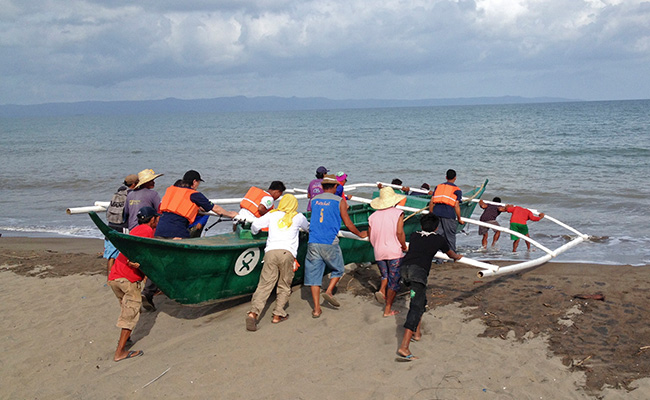
Getting beyond relief
 Launching newly built Oxfam boat.
Launching newly built Oxfam boat.
It is always uplifting to be reminded of what we are all here for. And nowhere brings this home more vividly than Oxfam's work in the Philippines a few months after the typhoon.
As I visit the makeshift Oxfam boat building workshop amidst the rubble of what used to be a big stone house close to the waterside near Tacloban, my guide tells me of his visit just days after the typhoon. He was searching for the house owner who had trusted its sturdy walls, but whose body has still never been recovered. Now, there are about 50 local fishermen hard at work clearing land, repairing their old boats and building new improved fibreglass ones. Close by are groups of women making and repairing nets.
All are working on an Oxfam-supported recovery programme. This follows on from earlier cash and cash-for-work distributions to help meet their immediate needs. As I talk to the fishermen and women, they have clearly worked with Oxfam staff to shape this programme. They know what they want and appreciate that the programme gives them both an immediate income and a restored livelihood at the end of it.
But it isn't enough simply to repair boats and restore the old ways. Building so many new boats with traditional hardwood would aggravate deforestation and break the law. And with the carpentry and fibreglassing, fishermen are also learning new skills. At another site along the coast, women are also learning carpentry skills to help repair boats and houses, so it is not only the men who have these new opportunities.
I like the balance between restoring the old ways and challenging the longstanding constraints that keep people poor.
I go out in one of the first of the newly built motorised canoes, painted in Oxfam green and piloted by a fisherman who lost his house and a family member in the storm. He has never owned his own boat and has worked for others when they needed him. He helped build and is now a proud co-owner of this one.
We fish a mile offshore, but our catch is not good - barely enough to cover costs and feed a small family. Coastal reefs and fish stocks have been damaged by the storm and the waters overfished. So the Oxfam team are exploring the viability of building groups of fishermen owning bigger boats that can fish deeper waters where catches will be bigger, but where only the richer commercial operators can currently go.
This challenge to the status quo is even more important for the coconut farmers who are among the poorest people in the country and whose trees have been massively damaged. The trees can't be replanted till the land is cleared and even then it will take years to bear fruit. Small farmers need help to feed themselves today, and to cover the cost of clearing the trees and debris, which involves renting equipment.
Even then, new trees alone will never be enough for them to work their way out of poverty. They need support for improved intercropping so they don't have to wait years for an income. They also need help to add value to their raw materials and to get a better deal at market. They need strong allies to push the government for land reform that will give them greater security and rights, as well as to spend the special tax that it has charged on their crops but never spent to modernise the industry's outdated practices and low investment.
Oxfam has responded to these farmers immediate needs. And we have also been working on a number of the bigger issues for years, although not in the areas worst hit by the typhoon. I joined a meeting with two national level partners, the Coconut Farmers Association and the Fair Trade Association to improve the linkages between what we have been doing and the needs of those so recently affected.
These relationships show why it is so important that Oxfam continues to value and improve the links between all three elements that combine to form the distinctive way we work: high quality and timely humanitarian responses that meet people's immediate needs; sound development programming to create positive opportunities; and the advocacy and campaigning that challenge the policies and practice that keep people poor.
The situation in the Philippines, as in so many other countries in which we work, needs a large-scale, long-term response which combines these three elements of our work. It is exciting that Oxfam in the Philippines is already working in this way and now planning how to move forward even more strongly.
Mark Goldring
Chief Executive of Oxfam GB
Follow Mark Goldring on Twitter

